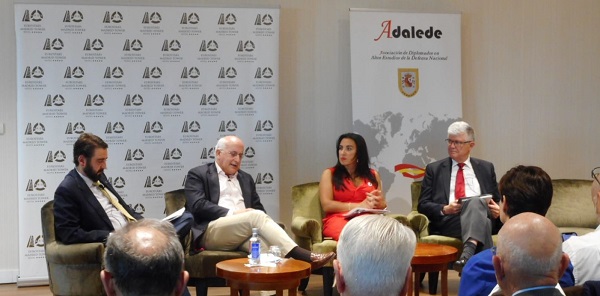For the first time, Defence policy gets inside European elections

For the first time in the history of European Parliament elections held in Spain, security and defence issues have managed to have their own space in the electoral campaign. Thanks to the initiative of Article 30 (A30), think-tank specialized in Defense policy, and the Association of Graduates in Higher Studies of National Defense (Adalede), the candidates Javier Zarzalejos (People’s Party), Mónica Silvana (PSOE) and Matías Alonso (Ciudadanos) participated in a debate to address the challenges of the European Union. The presence of diplomatic representatives was remarkable and not only of European countries.
What was especially striking is that an aspect so uncomfortable for the electoral narrative, such as security and defence, has managed to fill one of the rooms of the Eurostars Madrid Tower. The priorities of the debate were the European geopolitical scenario, the consequences of Brexit, the advances in foreign policy, the needs and interests of the member states, and the measures carried out in the Union on defence, especially on industrial issues.
Moderated by Jesús de Ramón-Laca, former advisor to two defence ministers, the candidates had the opportunity to highlight the most relevant proposals of their respective programs, as well as to present initiatives to make the influence of Spanish interests more effective. Interest in technological programs and capacity development was one of the topics of greatest consensus.
Javier Zarzalejos, the popular candidate, warned that the European Defence Fund “is not a gift”, that a strong investment by each State is necessary, that its impulse should avoid the possible Franco-German oligopoly and that it must be able to compete with United States and China. On the other hand, Ciudadanos’ candidate, Matías Alonso, was the greatest defender of the creation of a European Army and added that it should be led by Spain. He also opted to develop the cooperation of intelligence agencies, especially in financial matters, as an area to fight against terrorism.
Mónica Silvana said that there will be few differences about essential issues, but that it is necessary to develop a joint line of work, oriented towards public opinion and the dissemination of the Defence conscience. Finally, in relation to the departure from the United Kingdom, from the perspective of the transatlantic relationship, all of them agreed that Spain has the opportunity to be the most direct link between the European Union and the United States.
We trust that this initiative can serve as a stimulus to continue developing interest in strategic security issues and defence policy, an aspect that should not go unnoticed by public opinion, as we have in our southern border, in the immense Sahel, the most unstable region in the world.
Leticia Benítez, political analyst of A30
This article was originally published in The Diplomat in Spain